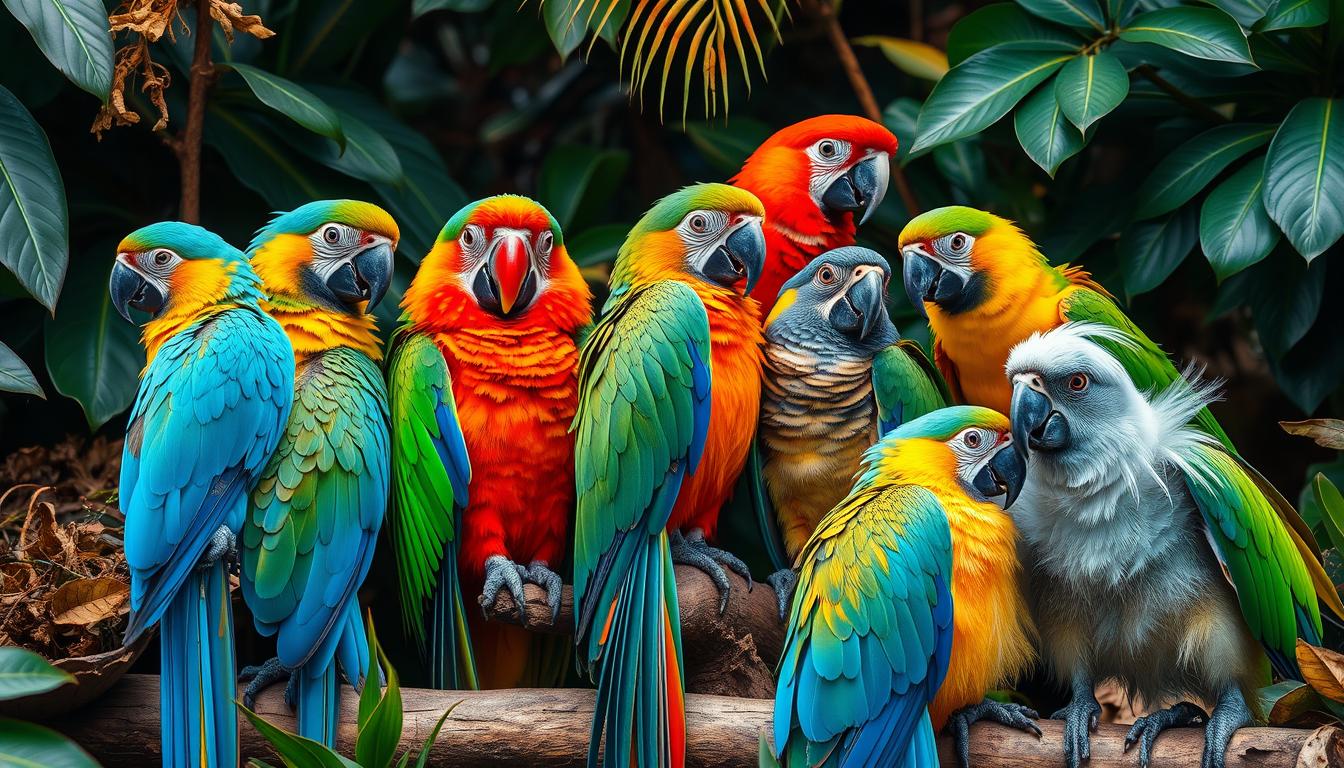Looking into your parrot’s bright eyes, you might wonder, “How long will they stay with me?” Parrots are known for their lively personalities and smarts. Knowing how long they live is key for being a good pet owner. This guide will help you understand how long these amazing birds can live.
Parrots can live a long time, from 8 years for the small ones to over 50 years for the big ones. Small parrots usually live 8–15 years, while the biggest ones, like macaws, can live 25–50 years or even longer. The oldest parrot, a blue-and-gold macaw named Charlie, lived to be 114 years old!
So, what makes parrots live so long? Birds in homes often live longer than those in the wild. They have less danger from predators, better vet care, and special food. Good care, like the right food and fun activities, helps parrots live longer. These smart birds need a lot of time and effort, so think carefully before getting one.
Table of Contents
Understanding Parrot Longevity in Captivity vs Wild
Parrots are known for their vibrant personalities and impressive longevity. They often live longer in captivity than in the wild. This is because they face fewer threats and receive better care from humans.
Factors Affecting Wild Parrot Survival
How Long Can Parrots Live : In the wild, parrots face many challenges that can shorten their lifespan. Predation, competition for resources, disease, and environmental stressors all play a role. Smaller parrot species may live 8 to 15 years, while larger ones can reach 25 to 50 years.
Benefits of Captive Care for Longevity
Parrots in captivity enjoy a safe environment, proper nutrition, and regular vet visits. These factors can greatly extend their lifespan. Some parrots may live up to 75 to 100 years with exceptional care.
Documented Age Records in Captivity
The oldest documented parrot was a blue-and-gold macaw named Charlie, who lived to at least 114 years old. Data from over 130,000 parrots across 217 species showed lifespans ranging from 2 years for fig parrots to 30 years for scarlet macaws. Larger brain size in parrots is linked to longer life spans and greater intelligence.

Parrots need daily mental stimulation, similar to a preschooler’s. In the wild, they spend 40% to 75% of their time foraging. This is key for their mental and physical health in captivity. Proper care and enrichment can help captive parrots thrive and live longer, healthier lives.
Small Parrot Species Lifespan Overview
Size matters when it comes to parrots and their lifespan. Smaller parrots, like budgerigars, lovebirds, and parrotlets, usually live between 8 to 15 years. This is less than larger parrots.
Cockatiels, a bit bigger, can live longer, up to 30 years. The lifespan of small parrots depends on genetics, care, and health. They also grow up faster, sometimes as young as six months.
| Parrot Species | Lifespan (in captivity) |
|---|---|
| Budgerigar (Parakeet) | Up to 20 years |
| Cockatiel | 15 to 20 years |
| Parrotlet | 20 to 30 years |
| Lovebird | 10 to 15 years |
The small parrot lifespan can change a lot. It depends on the bird, its care, and attention. Good food, a nice home, and vet visits are key for their health.

Even though smaller parrots like budgerigars, lovebirds, and parrotlets don’t live as long, they can be great pets. Knowing their needs helps them live a happy, long life.
Medium and Large Parrot Life Expectancy
The size of a parrot can affect how long it lives. Medium-sized parrots, like conures and Quaker parrots, live between 15 to 30 years. They are known for their lively personalities and how well they connect with people.
Larger parrots, including African greys and macaws, can live up to 50 years or more. These birds have amazed bird lovers for years. Their long lives show how strong and adaptable they are.
Record-Breaking Parrot Ages
Some parrots live much longer than others. Cookie, a Major Mitchell’s cockatoo, holds the Guinness World Record for living 83 years at the Brookfield Zoo.
African greys and macaws can live into their 60s and 70s. With the right care, some parrots have even lived over 100 years. This shows how long and resilient these smart birds can be.

“Parrots are living longer than ever before, thanks to advancements in avian medicine and a greater understanding of their unique care requirements.”
How Long Can Parrots Live With Proper Care
Good care can make a big difference in a parrot’s life. The right food, space, and mental activities can help them live a long life. Whether it’s a small budgie or a big macaw, the right care is key.
Here are some important factors for a long life:
- Balanced Diet – Give them a mix of fresh fruits, veggies, and quality pellets, not just seeds.
- Regular Veterinary Care – Take them for check-ups to catch health issues early.
- Ample Space and Enrichment – Make sure they have a big, safe place with lots of toys and things to do.
- Mental Stimulation – Keep them busy with training, toys, and social time to avoid boredom.
- Proper Sleep Environment – They need 10-12 hours of quiet, dark sleep to stay healthy.
With the right parrot care tips, you can help your parrot live a long, happy life. Focus on their optimal parrot health and extending parrot lifespan to build a strong bond.
| Parrot Species | Average Lifespan (Captive) | Longevity Records |
|---|---|---|
| Cockatiel | 20+ years | Cockatiels can live over 20 years with proper care |
| Major Mitchell’s Cockatoo | 40-70 years | The oldest confirmed parrot, “Cookie,” lived for 82 years |
| Salmon-crested Cockatoo | 40-60 years | One individual lived for 92 years |
| Macaw | 50+ years | Some macaws have been reported living well over 100 years |
| African Grey Parrot | 40-60 years | In the wild, they live around 20-25 years, but in captivity, they can reach 40-60 years |
| Budgerigar (Parakeet) | 5-15 years | The Guinness World Record budgie lived for 29 years |
Remember, owning a parrot is a big commitment. It’s important to focus on their parrot care tips, optimal parrot health, and extended parrot lifespan for their whole life.

“Parrots make wonderful lifelong companions, but their longevity requires a serious commitment from their owners. Providing the best possible care is essential for their health and well-being.”
Essential Nutrition for Maximum Lifespan
For your parrot to live a long and healthy life, a balanced diet is key. They need a mix of high-quality pellets, fresh fruits, veggies, and grains. Knowing your parrot’s dietary needs helps them get the nutrients they need to live long.
Balanced Diet Requirements
Make sure pellets are 80% of your parrot’s food. These foods are complete and balanced for parrots. Add fresh produce like:
- Vegetables (60% of diet)
- Low-sugar fruits (5-10%)
- Grains and nuts (5% each)
- Herbs and flowers (5%)
This mix of parrot nutrition gives your bird the vitamins, minerals, and antioxidants they need. This keeps them healthy and long-lived.
Common Nutritional Mistakes
One big mistake is feeding only seeds. Seeds are tempting but don’t have the nutrients parrots need. Eating too many fatty seeds and nuts can cause obesity and health problems.
Dietary Supplements and Treats
Supplements might be needed to fill nutritional gaps, but talk to a vet first. Treats should be given sparingly to keep a healthy parrot diet. Calcium-rich foods like boiled eggshells are good supplements.

Focus on a balanced parrot diet and avoid common parrot dietary mistakes. This helps your parrot live a long and happy life. Work with an avian expert to create the best nutrition plan for your parrot.
Health Factors Affecting Parrot Longevity
Keeping your parrot healthy is key for a long, happy life. Regular vet visits are crucial to catch parrot health issues and avian diseases early. Parrots often face problems like vitamin A deficiency, sinus infections, chlamydia, and aspergillosis.
Signs of illness include eye or nasal discharge, loss of appetite, and odd behavior. Catching these signs early can help prevent serious problems. This is why parrot veterinary care is so important.
Parrots can also get obese or suffer from nutrient deficiencies. This is often due to bad diet and not enough exercise. Feeding them a mix of fruits, veggies, grains, and special pellets is better. Avoid giving them too many high-fat seeds.
Stress can cause problems like feather plucking. This can harm your parrot’s health. Make sure they have enough space, toys, and social time. This keeps them happy and healthy.
“Parrot ownership is a long-term commitment, requiring responsible care practices to ensure a happy and healthy relationship.”
Understanding what affects parrot health helps you care for them better. This way, you can improve their life quality and how long they live.
Regular vet visits, a good diet, and a fun environment are vital. With the right care, your parrot can live a long, joyful life with you.
Environmental and Mental Stimulation Needs
Creating the right environment and mental stimulation is key for parrots’ well-being. These smart birds need big cages to stretch and explore. Add various perches for climbing and exercising.
Use different textures and shapes to keep your parrot interested.
Cage Setup and Space Requirements
Parrots need lots of space to be happy. Smaller birds like budgies and cockatiels need cages that are at least 24 inches wide and 36 inches tall. Bigger parrots, like African Greys and macaws, need even more space.
Their cages should be at least 6 feet wide and 7 feet tall. Make sure the cage is big enough for your parrot to move around and fly.
Social Interaction Requirements
Parrots love to be around people or other birds. Some, like cockatoos and macaws, do well with a feathered friend. Others, like African Greys, might prefer being alone.
Either way, spend time with your parrot every day. Play with them, teach them tricks, and handle them gently.
Enrichment Activities
Boredom can harm parrots’ health and behavior. Give them lots of toys, puzzles, and things to chew on. Change these things often to keep them interesting.
Try toys that make noise and give them things to forage. This keeps their minds active and curious.
By making a fun environment, encouraging social time, and providing activities, you’ll keep your parrot happy and healthy. This will make your parrot a loyal and engaging friend for years.

Signs of Aging in Parrots
As aging parrots get older, they may show changes in how they act and look. Knowing the signs of aging in your parrot can help you care for them better. This ensures they are comfortable in their golden years.
One early sign is a drop in activity. Older parrots might move less and sleep more. They might also talk less or softer than before.
Feather quality changes, like dullness or brittleness, are also signs. Some parrots, like African Grey Parrots, may show age in their eyes or feathers.
As parrots age, they need different diets and care. Regular vet visits are key to keep them healthy and happy.
| Parrot Species | Average Lifespan | Record Lifespan |
|---|---|---|
| Budgerigar (Budgie) | 10–15 years | 21 years |
| Cockatiel | 15–20 years | 35 years |
| Senegal parrot | 25–35 years | 20 years |
| African grey parrot | 35–45 years | 49.7 years |
| Sulfur-crested cockatoo | 40–55 years | 57 years |
Understanding signs of aging in parrots helps you give them the best elderly parrot care. This way, they can live a happy and comfortable life in their senior years.

Conclusion
Parrot lifespans vary a lot. It depends on the species, care level, and individual factors. Smaller parrots like budgerigars and cockatiels live 5 to 18 years. But, bigger parrots like Amazon and macaws can live over 50 years, sometimes up to 70.
For your parrot to live long and happy, feed them well and take them to the vet regularly. Make sure they have fun things to do and lots of time with you. Before getting a parrot, think about caring for it for its whole life.
Learning about parrot lifespans and caring for them long-term can create a strong bond. You’ll enjoy many years of happiness and special moments with your parrot.















Leave a Reply